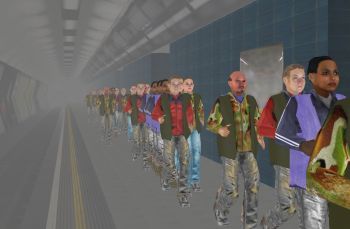Broadcast: News items
Study reveals crowd co-operation during 7/7 bombings
By: Alison Field
Last updated: Tuesday, 5 May 2009

Sussex psychologist Dr John Drury has published the first social-psychological study of crowd reactions among survivors of the London bombings on 7 July 2005.
Although a number of previous studies have looked at Post Traumatic Stress Disorder and preparedness among Londoners following the bombings, this is the first to look at the behaviours of survivors and witnesses during the explosions and their immediate aftermath.
John and his co-authors, Dr Chris Cocking (formally at Sussex, now at London Metropolitan) and Professor Steve Reicher, gathered accounts from over 90 survivors.
The researchers' key findings were:
- There was no 'mass panic' and little selfishness, despite the fact that people felt in danger of death, saw little hope of escape and were mostly among strangers.
- Instead, there was widespread mutual concern, co-operation and helping in the crowd.
- Given the time taken for the emergency services to arrive on the scene, it was the survivors themselves who were the 'first responders'; they tied tourniquets, constructed makeshift bandages for each other, tried to save each others' lives and gave emotional support.
The people interviewed made clear that they felt a strong sense of camaraderie, unity and togetherness with the rest of the crowd; indeed, their 'common fate' had brought them together and motivated mutual aid.
Based on this study and on other studies of emergencies such as the Hillsborough disaster, John and the team have drawn the following conclusions:
- Crowd in emergencies need to be viewed as a social psychological resource instead of a psychological problem.
- The 'collective resilience' that can arise in crowds in emergencies can enhance the chances of survival.
- The emergency services need to harness this phenomenon rather than inhibit it through excluding the crowd from its own self-protection and safety.
The report's findings and implications have already been included in recent NATO guidelines on psychosocial care for people affected by disasters and major incidents.
'The nature of collective resilience: Survivor reactions to the 2005 London bombings' is published in the April issue of the world's leading journal of disaster research, the International Journal of Mass Emergencies and Disasters.

